Related Research Articles
Reggio di Calabria, commonly and officially referred to as Reggio Calabria, or simply Reggio by its inhabitants, is the largest city in Calabria as well as the seat of the Regional Council of Calabria. It has an estimated population of nearly 200,000 and is the twenty-first most populous city in Italy, after Modena, and the 100th most populated city in Europe. Reggio Calabria is located in the exact center of the Mediterranean and is known for its climate, ethnic and cultural diversity. It is the third economic centre of mainland Southern Italy. About 560,000 people live in the metropolitan area, recognised in 2015 by Italy as a metropolitan city.
In Greek mythology, Dardanus was the founder of the city of Dardanus at the foot of Mount Ida in the Troad.
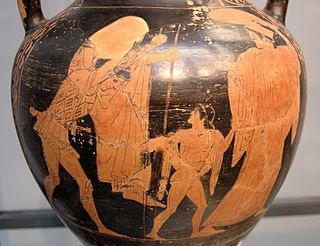
Ascanius was a legendary king of Alba Longa and is the son of the Trojan hero Aeneas and Creusa, daughter of Priam. He is a character in Roman mythology, and has a divine lineage, being the son of Aeneas, who is the son of the goddess Venus and the hero Anchises, a relative of the king Priam; thus Ascanius has divine ascendents by both parents, being descendants of god Jupiter and Dardanus. He is also an ancestor of Romulus, Remus and the Gens Julia. Together with his father, he is a major character in Virgil's Aeneid, and he is depicted as one of the founders of the Roman race.

In Roman mythology, Evander was a culture hero from Arcadia, Greece, who was said to have brought the Greek pantheon, laws, and alphabet to Italy, where he founded the city of Pallantium on the future site of Palatine Hill, Rome, sixty years before the Trojan War. He instituted the festival of the Lupercalia. Evander was deified after his death and an altar was constructed to him on the Aventine Hill.

In Roman mythology, King Numitor of Alba Longa, was the maternal grandfather of Rome's founder and first king, Romulus, and his twin brother Remus. He was the son of Procas, descendant of Aeneas the Trojan, and father of the twins' mother, Rhea Silvia, and Lausus.

In Roman mythology, Amulius was king of Alba Longa who ordered the death of his infant, twin grandnephews Romulus, the eventual founder and king of Rome, and Remus. He was deposed and killed by them after they survived and grew to adulthood.
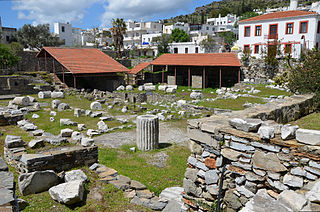
Halicarnassus was an ancient Greek city in Caria, in Anatolia. It was located in southwest Caria, on an advantageous site on the Gulf of Gökova, which is now in Bodrum, Turkey. The city was famous for the Mausoleum of Halicarnassus, also known simply as the Tomb of Mausolus, whose name provided the origin of the word "mausoleum". The mausoleum, built from 353 to 350 BC, ranked as one of the seven wonders of the ancient world.
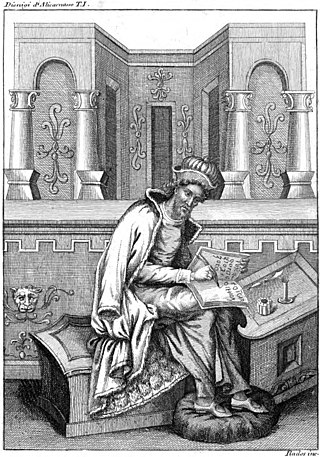
Dionysius of Halicarnassus was a Greek historian and teacher of rhetoric, who flourished during the reign of Emperor Augustus. His literary style was atticistic – imitating Classical Attic Greek in its prime.

Spurius Cassius Vecellinus or Vicellinus was one of the most distinguished men of the early Roman Republic. He was three times consul, and celebrated two triumphs. He was the first magister equitum, and the author of the first agrarian law. The year following his last consulship, he was accused of aiming at regal power, and was put to death by the patricians.
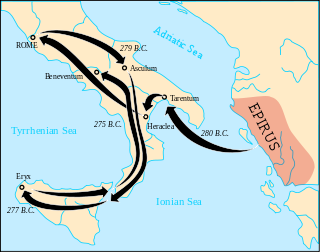
The Pyrrhic War was largely fought between the Roman Republic and Pyrrhus, the violent king of Epirus, who had been asked by the people of the Greek city of Tarentum in southern Italy to help them in their war against the Romans.
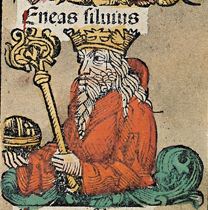
Aeneas Silvius is the son of Silvius, in some versions grandson of Ascanius and great-grandson, grandson or son of Aeneas. He is the third in the list of the mythical kings of Alba Longa in Latium, and the Silvii regarded him as the founder of their house. Dionysius of Halicarnassus ascribes to him a reign of 31 years. Ovid does not mention him among the Alban kings. According to Livy and Dionysius, the heir of Aeneas Silvius was named Latinus Silvius.

In Greek mythology, Lycaon was a king of Arcadia who, in the most popular version of the myth, killed and cooked his son Nyctimus and served him to Zeus, to see whether the god was sufficiently all-knowing to recognize human flesh. Disgusted, Zeus transformed Lycaon into a wolf and killed his offspring; Nyctimus was restored to life.

The kings of Alba Longa, or Alban kings, were a series of legendary kings of Latium, who ruled from the ancient city of Alba Longa. In the mythic tradition of ancient Rome, they fill the 400-year gap between the settlement of Aeneas in Italy and the founding of the city of Rome by Romulus. It was this line of descent to which the Julii claimed kinship. The traditional line of the Alban kings ends with Numitor, the grandfather of Romulus and Remus. One later king, Gaius Cluilius, is mentioned by Roman historians, although his relation to the original line, if any, is unknown; and after his death, a few generations after the time of Romulus, the city was destroyed by Tullus Hostilius, the third King of Rome, and its population transferred to Alba's daughter city.
Xanthus of Lydia was a Greek historian, logographer and citizen of Lydia who, during the mid-fifth century BC, wrote texts on the history of Lydia known as Lydiaca (Λυδιακά), a work which was highly commended by Dionysius of Halicarnassus. Xanthus also wrote occasionally about geology. It is believed that Xanthus was the earliest historian to have written a significant amount on the topic of Lydian history. He is also believed to have written a work entitled Magica (Mαγικά), as well as one entitled Life of Empedocles. It is believed that Xanthus had some knowledge of Persian traditions, and it is plausible that he, a Lydian, would write about Persian religion, but it seems unlikely due to the available evidence. His seat was believed to be at Sardis, the capital. A contemporary and colleague of Herodotus, most of his writings concerned the lineage and deeds of the Lydian kings. Xanthus was known for writing in the traditional Ionian style of trying to establish the scene of popular myths. One example of Xanthus using this type of writing style is when he placed the scene of the "giant's punishment" in Katakekaumene. Xanthus was also known for adapting historical events that were often considered boring into passages that the general Greek public would enjoy. Xanthus was one of the chief authorities used by Nicolaus of Damascus.
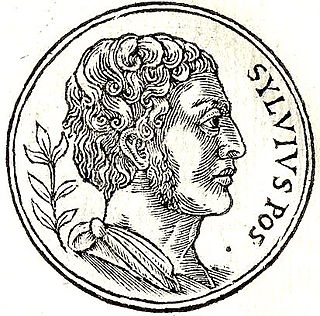
In Roman mythology, Silvius or Silvius Postumus, was either the son of Aeneas and Lavinia or the son of Ascanius. He succeeded Ascanius as King of Alba Longa and reigned 1139–1110 BC.
Anaxilas or Anaxilaus, son of Cretines, was a tyrant of Rhegium in Magna Graecia. He was originally from Messenia, a region in the Peloponnese.
Marcus Horatius Pulvillus was an aristocrat before and during the early Roman Republic at the time of the overthrow of the Roman monarchy. He was a suffect consul in 509 BC and elected again in 507 BC, according to the Varronian chronology.
In Greek mythology, Pylaeus, son of Lethus, son of Teutamides, descendant of Pelasgus. He was one of the allies to King Priam in the Trojan War; he commanded the Pelasgian contingent together with his brother Hippothous. Pylaeus is hardly ever mentioned separately from his brother; they are said to have fallen in battle together by Dictys Cretensis and to have been buried "in a garden" according to the late Latin poet Ausonius.
Micythus, son of Choerus, was a 5th-century BC tyrant of Rhegium and Zancle in Magna Graecia. He also founded the city of Pyxus.
In Greek mythology, Tyllus is an Autochthon of Lydia. He was the father of Halie, who married Cotys, an early king of Lydia. Tyllus is attested by only one author: Dionysius of Halicarnassus, in his Roman Antiquities. However, the same family tree of the early Kings of Lydia can be in Herodotus and Xanthus.
References
![]() This article incorporates text from a publication now in the public domain : Smith, William, ed. (1870). "Leophron". Dictionary of Greek and Roman Biography and Mythology .
This article incorporates text from a publication now in the public domain : Smith, William, ed. (1870). "Leophron". Dictionary of Greek and Roman Biography and Mythology .
